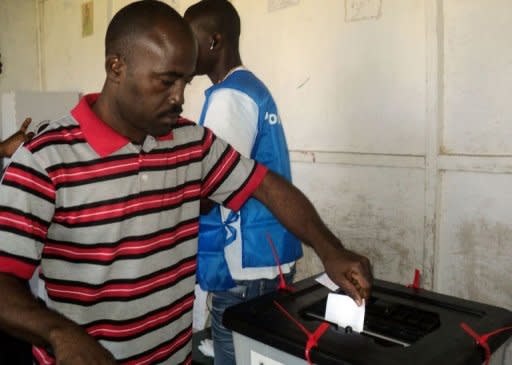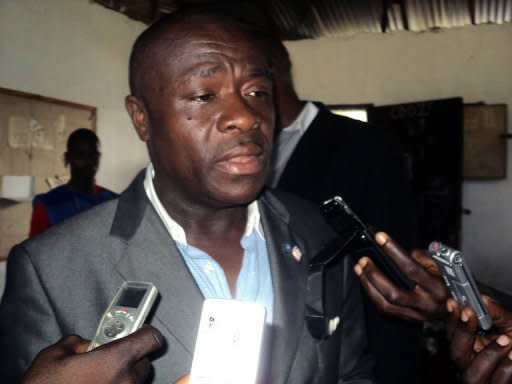Liberia votes in contentious referendum
Liberians voted Tuesday in a referendum that was marred by a low turnout, a ballot paper misprint and opposition boycott, just weeks before the country's second post-war presidential polls. The constitutional referendum is seen as a key test for the country's National Electoral Commission (NEC), which has taken charge of elections for the first time since the end of a civil war in 2003. Opposition parties have fiercely opposed the referendum, which could change the election date and candidacy requirements in the midst of campaigning for presidential and legislative elections on October 11. The main opposition Congress for Democratic Change (CDC) candidate Winston Tubman boycotted the referendum, and on Tuesday morning candidate Reverend Kennedy Sandy refused to vote as an error emerged on ballot papers. While asking voters whether they want the retirement age of the chief justice changed from 70 to 75, the figure above both the 'yes' and 'no' boxes was 75. "This is fraudulent and the entire process needs to be cancelled," said Sandy, of the Liberia Transformation Party (LTP) who lived in America since 1989, recently returning to run for office. Tubman, relaxing in a hammock at home, told AFP the referendum was unconstitutional because it was "too close to election time, too much money wasted and too much work for the election commission". "I am not surprised by the error made by the commission. They have not organised elections before, now you want them to organise a referendum while in the process of organising elections?" NEC spokesman Bobby Livingstone confirmed the mistake, but played down its gravity. "We noticed this error a week before the referendum (but) we could not delay the process because of that. So if you mark 'yes' it means you agree, if you mark 'no' it means you are against it." This could prove confusing for many voters in the west African country, where some 75 percent of the population is estimated to be illiterate and observers have raised concerns over voter education around the referendum. Voter Cecilia Davids, 52, told AFP after voting: "I did not know how to vote and I asked them to explain to me how to vote. They also explained to me what I have to vote for, so I decided to vote no." Two thirds of voters need to have voted 'yes' to the changes for them to be ratified. Election officials reported very poor turnout among some 1.8 million registered voters as voting wrapped up at 1800 GMT. Counting would begin immediately. The stickiest change proposed under the referendum will amend the length of time presidential candidates must have lived in Liberia from 10 years to five consecutive years. This clause was suspended in 2005 elections since most candidates had just recently returned from exile. Observers say that if the change is passed, it could open up the field to more opposition parties, increasing President Ellen Johnson Sirleaf's chances of re-election. The International Crisis Group, a Brussels-based think tank, said in a report last week that if this clause was changed "the courts would probably have to interpret its possible effect on the fast approaching election". Another key change would shift the election date to November 8, to avoid the logistical nightmare of holding the polls in the middle of the rainy season. The final change aims to do away with expensive run-off elections in local and legislative polls and have public officers elected in a single round. Carrying out two significant electoral events back to back is a herculean task for election officials in the country, whose infrastructure and roads remain in tatters after having been destroyed in successive civil wars between 1989 and 2003, which left some 150,000 people dead.



